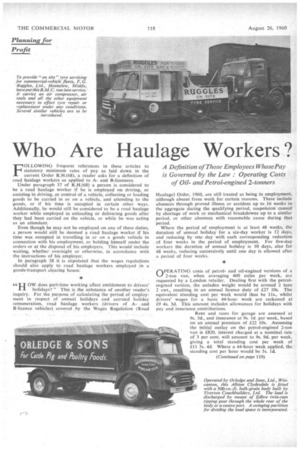Who Are Haulage Workers?
Page 74

If you've noticed an error in this article please click here to report it so we can fix it.
FOLLOWING frequent' references in these articles to statutory minimum rates of pay as laid down in the current Order R.H.(68), a reader asks for a definition of road haulage workers as applied to Aand B-licensees.
Under paragraph 37 of R.H.(68) a person is considered to be a road haulage worker if he is employed on driving, or assisting in driving, or control of a vehicle, collecting or loading goods to be carried in or on a vehicle, and attending to the goods, or if his time is occupied in certain other ways. Additionally, he would still be considered to be a road haulage worker while employed in unloading or delivering goods after they had been carried on the vehicle, or while he was acting as an attendant Even though he may not be employed on any of these duties, a person would still be deemed a road haulage worker if his time was occupied in travelling in or on a goods vehicle in connection with his employment, or holding himself under the orders or at the disposal of his employers. This would include waiting, whether overnight or otherwise, in accordance with the instructions of his employer.
In paragraph 38 it is stipulated that the wages regulations should also apply to road haulage workers employed in a goods-transport, clearing house.
4.414 OW does part-time working affect entitlement to drivers' holidays?" This is the substance of another reader's inquiry. . For the purpose. of calculating the period of employment in respect of annual holidays and accrued holiday remuneration, road haulage workers (drivers of A-, and B-lieence vehicles) covered _by the Wages Regulation (Road
Haulage) Order, 1960, are still treated as being in employment, although absent from work for certain reasons. These include absences through proved illness or accident up to 16 weeks in the aggregate during the qualifying period, suspension caused by shortage of work or mechanical breakdowns up to a similar period, or other absences with reasonable cause during that period.
Where the period of employment is at least 48 weeks, the duration of annual holiday for a six-day worker is 12 days, and reducing by one day with each corresponding reduction of four weeks in the period of employment. For five-day workers the duration of annual holiday is 10 days, also for 48 weeks, reducing successively until one day is allowed after a period of four weeks.
OPERATING costs of petroland oil-engined versions of a 2-ton van, when averaging 400 miles per week, are requested by a London retailer. Dealing first with the petrolengined version, the unladen weight would be around 2 tons 2 cwt., resulting in an annual licence duty of 127 10s. The equivalent standing cost per week would thus be 1 Is., whilst drivers' wages for a basic 44-hour week are reckoned at £9 4s. 3d. This amount includes allowances for holidays with pay and insurance contributions.
Rent and rates for garage are assessed at 9s. 3d., and insurance at 9s. Id. per week, based on an annual premium Of £22 10s. Assuming the initial outlay on the petrol-engined 2-ton van is £820, interest charged at a nominal rate of 3 per cent, will amount to 9s. 9d. per week, giving a total standing cost per week of £11 3s. 4d. Where a 44-hour week applied, the standing cost per hour would be 5s. id.




















































































































